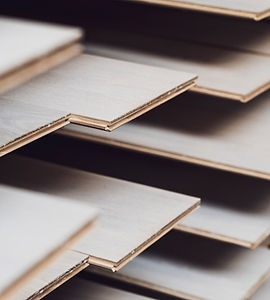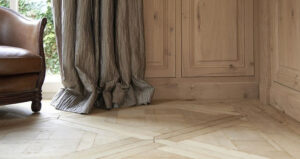Eco-Friendly Flooring, Part 2: Engineered Hardwood

Environmentally conscious living has become increasingly popular in recent years. As awareness of environmental issues and the impact of human activities on the planet has grown, more people are adopting sustainable practices and making eco-friendly choices in various aspects of their lives. Choosing eco-friendly flooring can be a pivotal step in creating a sustainable and environmentally conscious living space. In this three-part series about eco-friendly flooring options, we discuss what makes a floor eco-friendly in Part 1, the most popular alternative products to engineered hardwood available in today’s market in Part 3, and this article, Part 2, the factors that make engineered hardwood environmentally sound.
Homeowners have an incredible variety of options for environmentally-friendly flooring, and HAUTE PLANK is proud to offer engineered hardwood for environmentally conscious homeowners interested in the look and feel of solid hardwood. Every raw material chosen to produce the HAUTE PLANK line is PEFC-certified. This coveted certification is issued only to forests that are managed in line with the strictest environmental, social and economic requirements.
When affixed to a wood-based product, the PEFC trademark ensures that both the forest owner and the producing company are fully committed to implementing sustainable forest management practices.
Here are some ways in which engineered hardwood stands out as a green and stylish flooring solution.
Manufacturing & Forestry
Engineered hardwood is crafted from layers of real wood bonded together in a process designed to minimize waste. Unlike traditional hardwood flooring, where a single tree might yield only a limited number of planks, engineered hardwood utilizes more of the harvested wood. This reduces the demand for logging and promotes sustainable forestry practices.
Durability
Engineered hardwood is known for its durability and longevity. The construction of multiple layers makes it less susceptible to the expansion and contraction caused by changes in humidity, ensuring that your flooring maintains its integrity over time. This longevity is essential in reducing the need for frequent replacements, thereby decreasing overall environmental impact.
In terms of installation, engineered hardwood is often a more sustainable choice. Its click-and-lock or tongue-and-groove installation systems reduce the need for adhesives, minimizing the use of potentially harmful substances in your living space.
Air Quality
Engineered hardwood is generally considered a good choice for indoor air quality. Hardwood is naturally hypoallergenic and doesn’t trap allergens, dust mites, or pet dander. And unlike some flooring materials that may emit volatile organic compounds (VOCs) and other harmful substances, engineered hardwood tends to have lower emissions. The manufacturing process often involves using adhesives with low VOC content and is typically finished with low-VOC or water-based finishes, further minimizing the release of potentially harmful chemicals into the air.
Contact us today to explore our environmentally friendly flooring collection and make a positive impact on your home and the planet.


